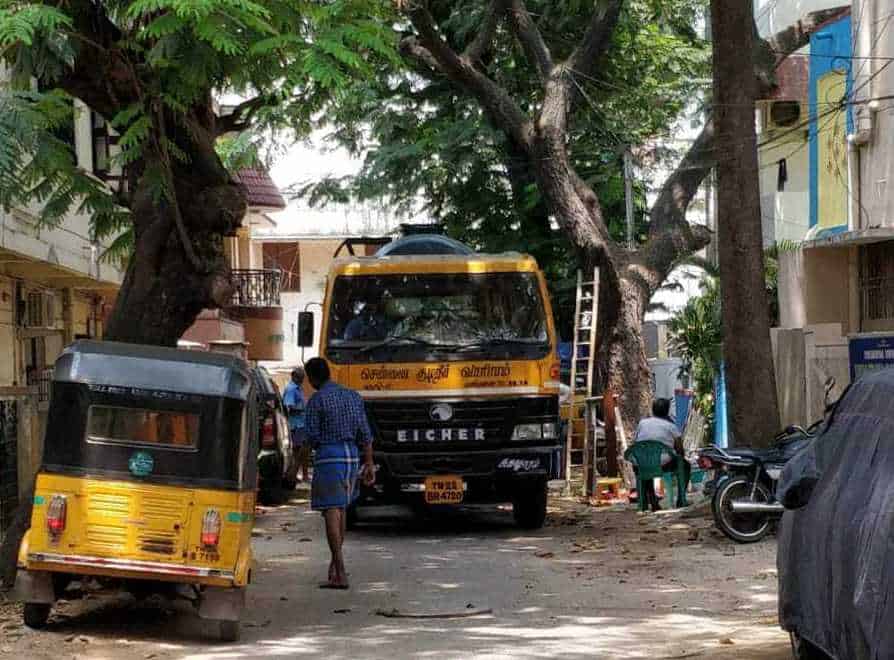As the summer intensifies across Chennai, the demand for water is also set to be on the rise. While some areas see residents rely on municipal water supply alone, others rely on purchasing from tankers or by digging or deepening borewell connections.
While residents use various means to meet their water needs, it is important to be aware of the proper procedure to follow while carrying out activities such as borewell digging or deepening. Callousness in this regard can not only affect the resident but also have an impact on the larger neighbourhood.
A recent incident in my neighbourhood has highlighted the need for residents to be mindful and for the larger community to be vigilant when it comes to the issue of digging borewells.
Borewell slurry dumping
A government official moved into a home on Thiruvengadam Street. Once the family had taken up residence,a large Sintex tank was placed within the compound to store water. While other residents struggled to get regular supplies, tankers could be seen filling water for the household every other day.
Subsequently the concrete topped road was dug up on several instances to replace the existing water mains only to ensure supply of water to this house. The residents of the neighbourhood have been filing petitions for years seeking the help from the agencies concerned to patch up the concrete topped road which was completely damaged due to the road cuts. To date we have not had a resolution to the issue that has stemmed from trying to ensure water supply to one household.
Recently, the resident also chose to drill a bore well in the house coinciding with the onset of summer. The following day, residents of the neighbourhood were shocked to see that the slurry that was drained out during the drilling process was being pumped into the sewage system. A manhole chamber on the street was opened illegally by the borewell digging company. The manhole was then being used to dump the slurry from the borewell digging process.
Read more: Here’s why we should look at reviving open wells in Chennai this summer
Rallying by residents
Residents in the street lodged a complaint with the Chennai Metro Water Supply and Sewerage Board (CMWSSB) officials. Only post the filing of the complaint by vigilant residents was the pumping of slurry brought to a halt.
As a result of the mixing of slurry with sewage, the entire sewage network within the street was clogged. Residents had to call for a jet rodding machine to the street to be able to clear up the clogs and ensure that the sewage lines were not blocked.
The slurry also overflowed on to the street. The entire stretch of the street near the manhole became treacherous owing to the seepage of the slurry. The road turned unsafe for motorists and pedestrians to navigate.
Vigilant residents were able to intervene at the right time to prevent further damage. People living within the community must find ways to come together in the larger interest and prevent any common issues arising in the locality. Through proactively engaging with officials and other residents, most issues faced by the community can be resolved.
Read more: Here’s how you can get a Metrowater connection in Chennai
Procedure to lay a borewell
The laying of borewells in the city has a few procedures that must be adhered to in order to not inconvenience other residents or violate the rules in place.
Residents are prohibited from digging borewells on streets and pavements. Such borewells are deemed illegal. The borewells can be dug only within the premises of the building, inside the compound walls.
Borewells and open wells in the premises of a household must be registered with the CMWSSB by filling out a form for the same. The submission can be made online or offline at the CMWSSB office or depot in the locality.
The registration details must be shared within 90 days to the CMWSSB. Residents must furnish information on purpose of use, type, depth and diameter of the borewell, type of pump and information on the EB connection that is to be used with the borewell. The information furnished must be accurate. The borewells may be subject to inspection and enumeration by the officials of the CMWSSB.
While digging borewells, slurry management must be done to ensure that the extracted slurry is not dumped in the surrounding areas or let into sewage lines like in the above instance. The slurry is to be taken away from the site by the company contracted for digging and disposed of responsibly.
Borewells dug at households cannot be used to extract water for commercial purposes such as water supply through tankers.
As more households undertake borewell digging , it is up to individuals to not deviate from these norms and not cause issues in the neighbourhood due to their negligence. Residents of the neighbourhood also have to remain vigilant and ensure proper slurry disposal is followed and the borewells are not used for commercial purposes, thereby leading to over-extraction.

